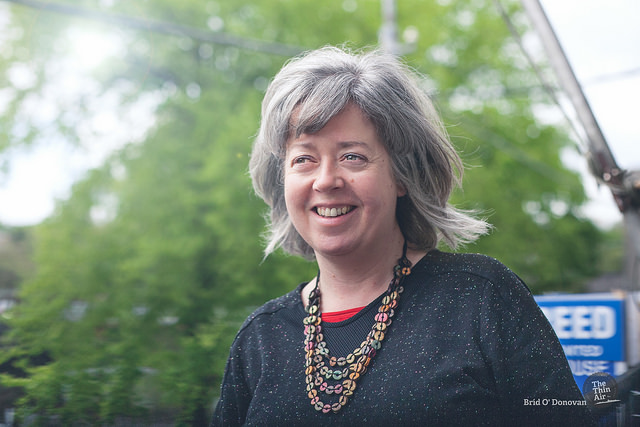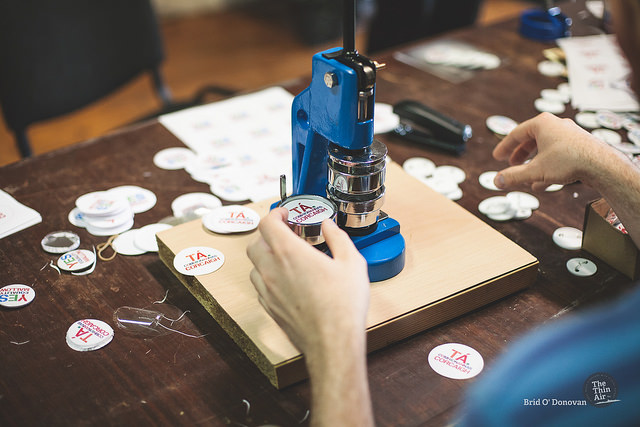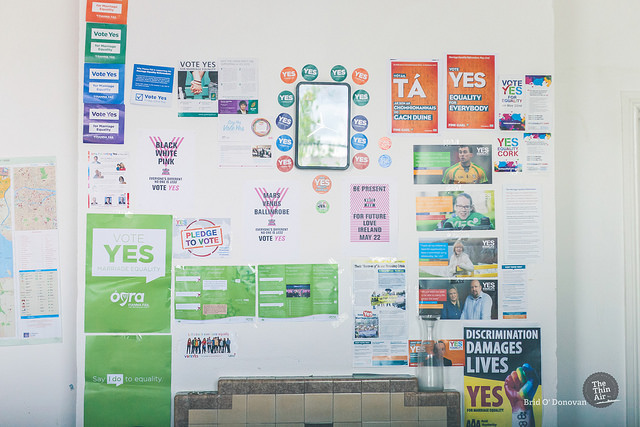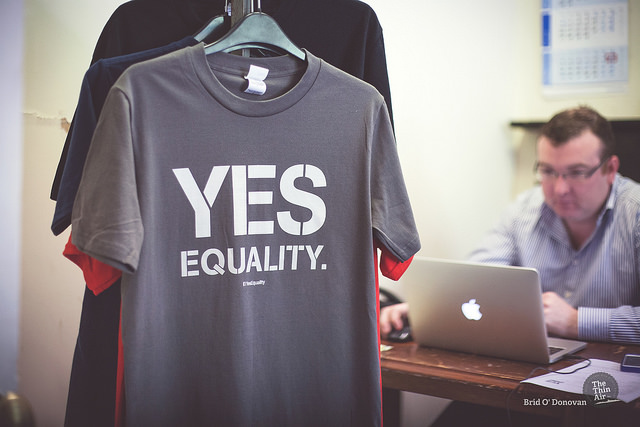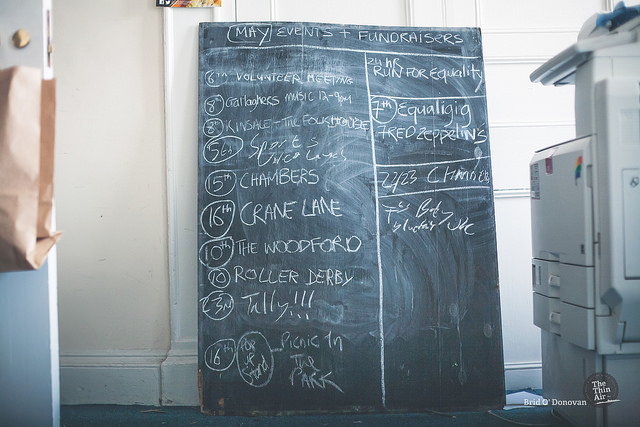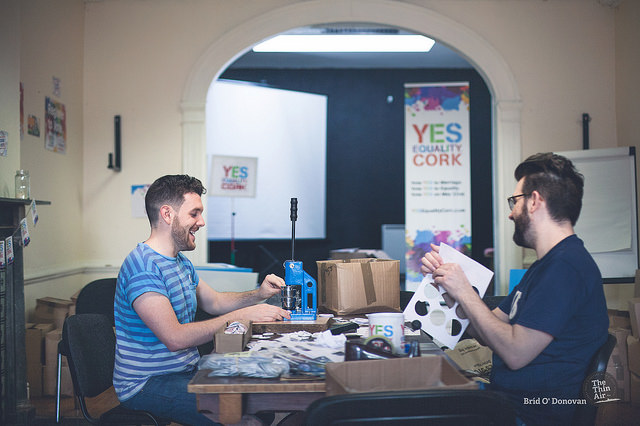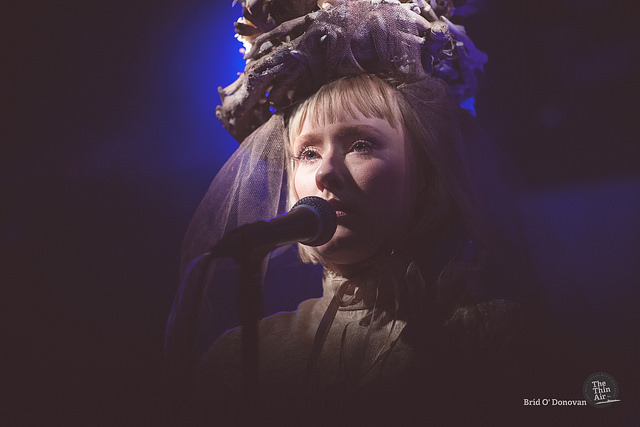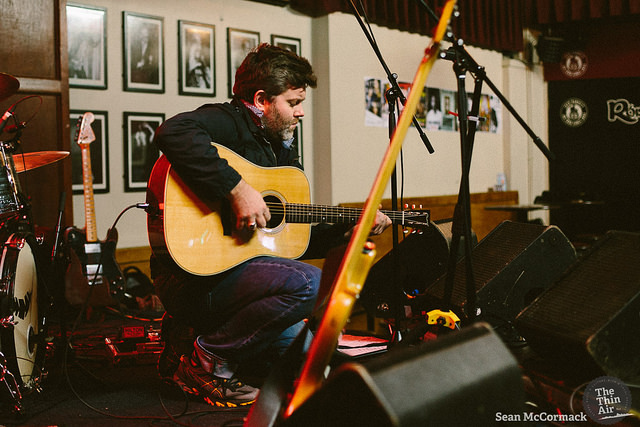In this installment of Cork Heads, Brid O’Donovan chats to Una Feely, the Campaign Coordinator for Yes Equality Cork. She also co-founded IndieCork and is part of the Management Committee. IndieCork runs from October 4 -11 this year.
Yes Equality Cork
My official title here is Campaign Coordinator, so basically it’s all the logistics around the campaign. What we are trying to do is to activate people into coming out and voting yes in the campaign and also to reach people who might be soft yeses, who are thinking about voting yes but with a little bit more information and they will vote yes. My own mother being an example of that at the weekend. I asked her what way was she leaning and she was leaning no. She had a few concerns around it which didn’t take much effort to answer but she had a certain version of half truths, mostly from her own church. She thought something terrible was going to happen with children and this, that and the other. If you answer a few questions truthfully, a lot of the time, and give people a bit more information, they are inclined to say “Well, actually yes I have no problem in voting yes.” My job here at the campaign is at the centre of that, coordinating all the office work and the admin around that. We are based out in Cork county as well. We have hubs in Bandon, Bantry, Clonakilty, Skibbereen and East Cork as well. This office is a central hub for all of those local organisations.
Personally, I’m a straight, married woman working on a campaign that is chiefly about LGBT rights and equality. I came in through the Quay Co-op. I’ve been doing some freelance work with them recently. The Co-op has a social aspect to it as well from a campaign aspect and they have helped to get the campaign off the ground. My trajectory is from the Co-op. In general it has been a real eye opener, actually, working here. I’ve been really amazed by the people I’ve met here who have always been campaigning for equality and for LGBT rights. Just to see their commitment and their level of honesty about the issues as well. Every night I’m here before they get here to go out canvassing around the city and their feedback from the canvassing is quite positive. There are also, a lot of unopened doors so you’d have to guess on the 23rd of May whether those unopened doors were yeses or nos or just didn’t come out to vote. I’ve learned a few lessons from the British elections last week in that the result was quite different to what people expected. I think here, we all hope that the high statistic in favour of Yes will hold but in reality, it will be really, really tight. That is what happens in referenda in Ireland, they are very tight. It’s barely one way or the other. A big part of our task is asking people to vote, just come out to vote and secondly to vote yes.
Seeing young people coming out and registering to vote has been really heartening. Those people really have a sense that they could make history here and it would be their generation that would make the history. Even though some do, some don’t remember a time in Ireland when it was actually quite tough not just to be LGBT but to be different in any way. Society wasn’t really evolved. This is almost the final frontier. This generation who have registered to vote and who are arriving here at six o clock in the evening to do an evening’s canvas and are out on the bridges in the morning handing out the leaflets – there’s a real sense of joy about them, in that they feel like they can make history and it would be their generation to do it.
It’s a very positive, very colourful campaign. All our literature has been colourful which makes people pick it up because it’s an attractive piece of literature. But we are being cautious because we could be in our own little bubble where everybody is saying yes and it will be about the people who don’t answer the door.
Coming to Cork and Staying
I grew up in Maynooth in County Kildare and I left landlocked Kildare as fast as I could and headed west to Galway. Off to the sea as fast as I could. I studied Ceramics there in what was then called the RTC and what is now called GMIT. I spent a few years there and then I came to Cork to pick up on the threads of that course. I went to the Crawford Art College here. I came to Cork in the late eighties to finish my course here and stayed ever since.
Things have changed and they have changed for the better. When I came in the late eighties it was suffering the financial depression that the rest of the country was going through too. I was the kind of place you felt needed to be picked up and lifted and raised a bit. Visually the place looks different. A lot of the quays were becoming derelict, around by Merchant’s Quay. That whole section was almost derelict. When things started to improve and developers were coming in, the city did start to look better. It had it’s big facelift a few years back. It’s a very handsome city anyway. I often find that when I go away to other places, in Ireland in particular, and I come back to Cork, I feel that Cork is a really handsome city. It’s got a great sense of space and individuality. It’s small but it’s not like Galway. Galway is intense and kind of a little bit on top of itself. In Cork, not just physically, there’s a great sense of space. There’s that sense of being allowed to do what you want without anyone encroaching on you. You can do things in Cork in a very relaxed way that I haven’t found you can do in other places. Of course there’s scenes but they don’t seem to be too locked inside themselves. There’s a good sense of flow in the city.
I spent a failed period of time locked in a studio where I mostly drank coffee and walked around town, so that didn’t last very long. I got into doing Arts Management and at the time it was the great era of the CE Fás Scheme, so you could get to work in a place for a short period of time and pick up work after that. I did that and I started in the National Sculpture Factory and I worked with Cork Artist’s Collective. I eventually ended up back in the Crawford Art College and I was working on Community Arts and Cork Community Art Link which has gone on to do great things in the city. I was there for a while and that was just before the start of The Kino cinema. I started programming in The Kino with Mick Hannigan and I was there ten years. In between I was also working with Cork Film Festival. So things moved from Arts Management to Film.
I always had an interest in film. In fact, in the Crawford my subsidiary study was film and photography. I was a great fan of the Triskel film club. It was the place you could go to in Cork to see foreign films and independent film. From there that was how I made inroads into the Cork Film Festival and The Kino.
I started with Cork Film Festival on the general selection panel and I did that for a couple of years. I actually started as a volunteer in 1991 and I was programming and managing The Kino in the mid nineties but I was also working with the Cork Film Festival on a part time basis. Then, I went into full time programming of the festival. Working with the two jobs together was very interesting. From the cinema side, from the showing of the film side, it was the commercial side. Even though it was independent and foreign film it was still very hard to run a cinema and make it work with those kind of films and get enough people in through the doors. The Kino did that for thirteen years and Mick Hannigan and myself are very proud of that. In the end it just wasn’t viable to keep it going. We didn’t have any government support or grants for the cinema so it was inevitable in one way that it would eventually shut. Film Festival and arthouse cinema are very compatible. They are different ends of the same chain really.
Cork Film Festival
From starting to work with them as a young volunteer to becoming the Festival Programmer, I was there for about nineteen years up until 2013. It was quite a long period. I was lucky but also Mick Hannigan, who was also the director of the festival then, had very, very open door policy in terms of people who were interested in film getting involved in the actual festival. That was there throughout the period that I worked there. We actively welcomed people into the building who had an interest in film. If you could bring something to the table in terms of your interests, your programming ideas – that’s what made it such a vibrant festival. That’s something that myself and Mick would be proud of in terms of the programming as well. It was a very responsive type of programming. We sought out interesting things to bring to the festival every year, we brought more in the experimental aspect of it. Something that was really seeking out what was interesting in the culture at the time and bringing it to Cork. We tried to keep that going on a number of different levels. Obviously you have the pressures of a big venue like Cork Opera House with getting films that were on that scale to screen in Cork to doing something far more niche and putting that on in Triskel Christchurch.
A lot of interesting filmmakers came to Cork who, themselves, felt like they had a relationship with Cork, with the city. And they came back a few times. The local scene too. Mick was a person who started the Made in Cork section. That definitely cultivated a filmmaking culture in Cork that did not have an outlet before. Filmmakers before that, at that time didn’t have something they were aiming for. St John’s College with their filmmaking course and Cork Film Centre, which is sadly almost gone, were instrumental to the cultivation of filmmaking in Cork too. That kind of culture, because there was something to aim for and there was an outlet for it. Made in Cork was a big celebration of filmmaking in Cork. We are quite proud of that as well.
To have this major film festival in the city, I think Cork people have been very open to that festival time every year. You’re working with something where people have an expectation of “I’m going to go to the film festival and what am I going to see?!” I think when Mick Hannigan and Theo Dorgan took the festival over in the eighties, they had a much more modern, contemporary vision about the festival. I was lucky to have come into the beginning of that, albeit as a young volunteer. The programming tastes changed from that period on in the nineties. It became much more of a festival about all the different types of film and emerging film and experimental film as well as your big film for the Opera House. I think in the latter years myself and Mick, took it more in that direction where it was more about what’s interesting and what’s happening. You don’t look for an audience of 200 for teeny tiny films that are experimental but you get an audience of about sixty or seventy people on a Saturday morning at 11 o’ clock in the Gate cinema and they are enjoying an experimental film, then well, I think that is creating an impact and people are going with it. You feel like you’re developing.
The ending of the Cork Film Festival for myself and Mick is well documented and out there. Google it and a lot of stuff comes up. Mick Hannigan and myself left very abruptly and it was a very painful period for us and in many ways that is still current and ongoing and it’s something you have to deal with. It hasn’t been easy on many different levels. You could say it’s a life’s work, which suddenly explodes and someone taps you on the shoulder, or worse, and you feel a heavy hand pushing you out. Mick and I would still be coping with that on a personal level but I think in terms of where he and I individually and together went with it with other people was that we arrived at IndieCork as a very very positive, creative future. A lot of people said at the time, on a personal level said “Why don’t you do something yourself?” and at time you’re so upset, you think “Oh I don’t know about that.” But within ten days, from talking to people around us and people who are now as with IndieCork and on the committee as me and Mick, we realised, absolutely we can do it. It’s not about someone tapping you on the shoulder and saying “You’re out of the game, you can’t play anymore”, it’s actually about “I can still do this and I can choose the parts that I thought were the most interesting and put it together.” It’s not about having a huge amount of municipal money or government money behind you. What is intrinsically interesting about the work and taking that with you and continually being able to do it, that’s what IndieCork for me on a personal level, is about.
IndieCork
There are seven people on the committee and each one of them brought their own thing to the table. We are not trying to create a mini-festival, similar to Cork Film Festival or similar to what Mick and I have worked on together before. It really is about creating something new and something that is responsive and vibrant and it’s not stagnant. It’s not about rolling out plans a year before you actually do the thing, which was something I was never terribly happy doing with the Cork Film Festival but it’s something you have to do to signal to funders that you have concrete ideas. IndieCork is about doing interesting work that’s cross-platform. Yes, there’s an awful amount of film and there’s some music in it but what we like about it is that we can be responsive and we can bring something to the festival that people have may not seen before. We can champion new talents even on our tiny, tiny budget. It’s about making a contribution to our city because none of us are paid for it. It’s completely a labour of love from start to finish. We don’t have any grant money. We have been extremely lucky in that the Rising Sons Brewery have funded the last two festivals and will fund this festival this year and it gives us enough money to put on something artistic and creative in the city. That’s what it is about for us.
We have plans to make it viable. It has to become viable because it is too much of an ask of people to remain unsupported and unpaid in something that is contributing. Our model is to try to make it viable. I couldn’t tell you where we will be in three or four years time, but that has a lifetime as well, when you can do something like that for nothing. In this particular instance, in this group of people who are running IndieCork now, our goals are to get the festival bedded down first of all. We are into our third year now which is still very young still. We need to put our roots down. We are willing to do that and put the effort in to do that and see where it goes.
It really matters to people living in the city what’s going on in the place and what they have access to. It mattered a hell of a lot to me when I was an eighteen year old student in Crawford that Triskel Film Club existed. That was a genuine reason for being in Cork, for me. It was a genuine attraction. Cork being a creative city matters to people, that’s why they move to a place and that’s their quality of their life in a place.
I think it’s an awful shame that Cork Film Centre is closing. I know that there are efforts there to keep it going and I hope they keep it going on some level. But I know as well that people lost their jobs from it. It’s really important that the infrastructure in the city, in terms of supporting things like Cork Film Centre or artists working in the city or people who are genuinely trying to get something going, is put in place. You have to look at arts policy and it goes back to government funding and to the local council funding as well and what they support. Those plans affect us all in terms of how we live in the city and how we put good stuff on in the city. I’ve very mixed feelings on the overview of how Cork is supported in those terms. There’s that old Irish word “piseog” where, you know, there’s that myth that if you keep knocking on the doors and you keep applying for funding and eventually someone will listen to you but I’ve known people who were never listened to and they just moved on to somewhere else. I know it’s not possible to fund everything you get an application for in the city. I think there has to be a clear structure and a clear policy about it that needs to be very encouraging to people. You can’t keep knocking on the door forever. I think in terms of film, as an example, how are you going to foster a film culture in a city if you make it difficult for people to make films here. There’s a confidence thing as well. If you don’t support something and create confidence and say Cork is a filmmaking city, Cork makes films, then it won’t happen. That talent will move on, and it does move on.
We getting into the serious planning now. We are just about to launch our call for entries and we’ll be showing films over the summer and programming not just films but music as well. We have a few new collaborators coming in this year as well and the doors are totally open for anybody with a good idea to come to us and say “I’d love to put this on.” We will look at it. That is one thing IndieCork is about is genuine creative collaboration as well. We may not have a lot of money but for us the joy is working with people who have good ideas. We are trying to be inventive and creative about the venues we use. It’s not always about money, as I said Rising Sons supports us but we are also putting films on in different places. In August we are going to do something a bit different that we’ll announce soon. But our aim is not to just be a festival for eight days in October. There’s too much going on outside of eight days in October. So we do have something that we are putting out there in August. That’s our model – to be active throughout the year.
Cork and it’s Heads
Last night I went to a gig in Coughlans. I went to see Mary Gauthier. She’s an alt country singer and she’s based Nashville. I was sitting there and thinking, “This is the charm of Cork in many ways.” That small room in Coughlan’s. Sixty seats jammed together and you’re seeing an amazing artist like Mary Gauthier on stage with a violinist and another guitarist. It just struck me. The title of your column is Cork Heads. Cork Heads, well there’s a lot of people out there in the city that make things like that happen. I have no idea how financially viable any of that is. It just struck me that we were all very privileged to be in a small room in Coughlan’s watching an amazing artist like her. There’s a lot of that in Cork.
I moved out of my usual train tracks, we’ll say, when I left Cork Film Festival and one thing that struck me was that there are so many different Corks. It’s not the one Cork. You get off your own train track and you are not in the same part of the city you are in everyday anymore, you’re not in that coffee shop. I’m over here and I’m seeing something completely different. There’s no valid “This is the official Cork.” That can tend to be a problem in the city. Positions of power tend to form around officialdom. When you step outside of that you realise that actually, other than having the stamp of ‘The Official’, it is absolutely no more valid than what’s going on down on the other end of the city. That was my experience. Just because something is supported and it’s official doesn’t make it more important than other things that are happening.

